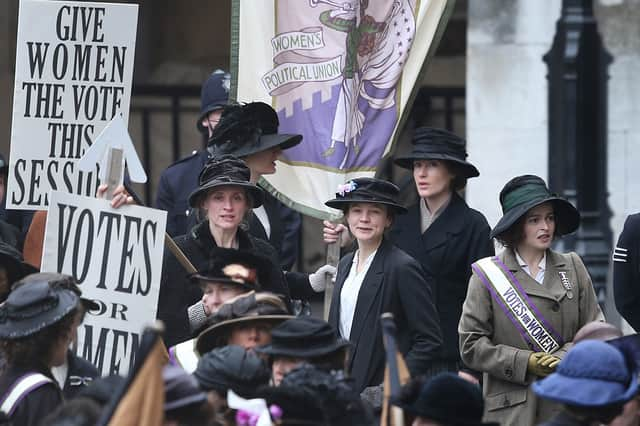FILM REVIEW: Suffragette


Suffragette (PG 13)
Political drama.
Starring: Carey Mulligan, Ann Marie Duff, Helena Bonham Carter, Meryl Streep. Running time: 106 mins.
Rating: ****
THIS IS a story that is long overdue in the cinema and has huge relevance for today’s fight for equality and women's rights.
Advertisement
Hide AdAdvertisement
Hide AdSuffragette, directed by a woman, written by a woman, produced by women, with a cast fronted by women, brings to the screen the campaign for the female vote.
Significantly, the central character is a working class woman, Maud (Carey Mulligan), leading an impoverished life working in an industrial laundry in the East End of London in 1912.
Horribly noxious fumes and scalding water mean accidents are a daily occurrence, while the Maud is being paid barely enough to survive.
Her boss sexually and physically harasses the young girls, including Maud herself when she is younger.
Advertisement
Hide AdAdvertisement
Hide AdMaud is sent to deliver a parcel in the West End and is shocked as suffragettes, including fellow worker Violet (Anne Marie Duff), smash store windows.
Back at work, Violet convinces a reluctant Maud to join and she meets local leader Edith (Helena Bonham Carter), a pharmacist supported in the cause by her husband.
Maud ends up giving testimony in parliament to cabinet minister David Lloyd George, who appears visibly moved by her account of working conditions.
But Maud learns her first political lesson when three months later she waits outside parliament only to learn a law giving women the vote has been rejected.
Advertisement
Hide AdAdvertisement
Hide AdThe crowd protest and the police brutally beat back and arrest many of them, including Maud.
Released a week later, she promises her unsympathetic husband that she will distance herself from the movement but she soon joins Violet at a secret gathering to listen to suffragette leader Emmeline Pankhurst (Meryl Streep) call for militant action and a campaign of civil disobedience after years of peaceful protest failed.
Thrown out by her husband and her son adopted - women did not get child rights until 1925 - she takes part in an arson campaign and is imprisoned and force-fed in shocking prison scenes resembling Guantanamo.
Whether called militant direct action or terrorism, Suffragette shows why women like Maud supported the cause and hoped life could be better.
Advertisement
Hide AdAdvertisement
Hide AdWhy were the suffragettes such a big threat to the people at the top?
The film shows the ruling class keeping their power by divide and rule — using the state’s brutal secret police as well as husbands at home.
The fight transcended the classes and some of the best moments depicts the women’s solidarity as they resolve never to give up the fight.
Cinematographer Eduard Grau uses naturalistic visuals and the 1913 Epsom Derby — where Emily Wilding Davison (Natalie Press) throws herself under the King’s horse — looks especially striking.
Advertisement
Hide AdAdvertisement
Hide AdAll women finally got the vote in 1928 and at the end there's a telling roll-call of when other countries agreed to do so, including New Zealand in 1893, Russia in 1917 and Switzerland in 1971.
Suffragette will inspire many to explore further what is often a hidden history of a battle still being waged.